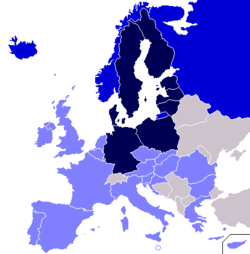CBSS

Council of the Baltic Sea States
|
|
 |
|
| Abbreviation | CBSS |
|---|---|
| Formation | 1992 (CBSS) |
| Type | Regional/Intergovernmental Organization |
| Headquarters | , Sweden |
|
Official language
|
English |
|
CSO Chairmanship
|
Sweden |
|
Director General (Secretariat)
|
Ambassador Maira Mora |
|
Main organ
|
CBSS Secretariat P.O.Box 2010, Slussplan 9, Gamla Stan, 103 11 Stockholm SWEDEN Tel: +46 8 440 19 20 Fax: +46 8 440 19 44 |
| Website | www |
CBSS Secretariat
The Council of the Baltic Sea States (CBSS) is a regional intergovernmental organisation working on three priority areas: Regional Identity, Safe & Secure Region and Sustainable & Prosperous Region. These three priority areas aim to address the themes of environment, economic development, entrepreneurship, education, culture, civil security, children's rights and trafficking in human beings.
The CBSS was established by the region’s Foreign Ministers in Copenhagen in 1992 as a response to the geopolitical changes that took place in the Baltic Sea region with the end of the Cold War. Since its founding, the CBSS has contributed to ensuring positive developments within the Baltic Sea region and has served as a driving force for multi-lateral cooperation.
Since 1998 the CBSS has been served by a permanent international Secretariat that is located in Stockholm, Sweden and funded by the Member States. The highest institution of CBSS is the conference of foreign ministers, which convenes every two years.
The CBSS has 12 members:
Other countries have observer status:
The Council Presidency rotates between the eleven Member States on an annual basis. Each Presidency lays down a set of specific priorities to guide the works of the Council for the Presidency year and lasts for one year from July 1 until June 30.
The Committee of Senior Officials (CSO) consists of high-ranking representatives of the Ministries of Foreign Affairs of the 11 CBSS Member States as well as of a high-level representative of the European Union. The CSO serves as the main discussion forum and decision-making body for matters related to the work of the Council between Ministerial Sessions. The CSO monitors, facilitates and aims to coordinate the work of all CBSS structures.
The period chaired by each country rotates on an annual basis and follows the Council Presidency. The CSO Chairman is a representative, usually at ambassadorial level, appointed by the Ministry of Foreign Affairs of the country which holds the Council Presidency.
A number of CBSS structures are operating under the auspices of the CSO.
In accordance with the Riga Declaration on the Reform of the CBSS from June 2008 one of the former working groups has been transformed into an Expert Group and the two other working groups have been dissolved.
The CSO monitors the work of the Expert Group on Nuclear and Radiation Safety, the Task Force against Trafficking in Human Beings (TF-THB), the Expert Group on Children at Risk, and coordinates the work undertaken in the agreed three long-term priorities 'Regional Identity', 'Sustainable & Prosperous Region' and 'Safe & Secure Region'.
...
Wikipedia
